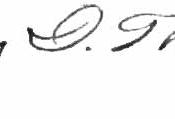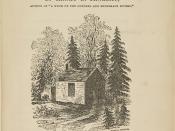In Walden, Thoreau uses techniques to convey thoughtful reflection and unwavering confidence towards his actions and convictions. By contemplating his past ventures and personal beliefs, he urges the reader to take specific paths in life with a strong and forceful credibility.
Thoreau's use of syntax expresses his philosophical yet audacious approach towards his quest to live simply and without superfluous needs. The semicolons and commas in the first sentence of paragraph four string together his descriptive memories of the Hollowell farm in a long and drawn out manner. The recollections tumble from his mind directly into his pen, causing the sentence to reflect his stream of rushing thoughts at a quick but steady pace. He fondly recalls the exact state and condition of every aspect of the farm, using commas to gracefully fit them into the sentence. In sentence four of paragraph ten, Thoreau deviates from his lengthy, pensive sentences to a short, repetitive exclamation stating, "Simplicity, simplicity, simplicity!" Instead of using eloquent and extensively written phrases to urge his readers to live a life of abnegation, he resorts here to a curtailed, but powerful statement that summarizes his dominant exhortation with a passionate fervor.
Such repetition reinforces his earlier passages in which he urges the reader to live without excess, revealing his confidence and therefore allowing his persuasion more authority.
Thoreau's use of diction allows the reader to understand his cogitative aversion and distaste towards the material world that is full of exorbitant and unnecessary goods. Life within such a society is "petty" and "fluctuating," and human improvements are "external and superficial." He is critical of America, for its states are constantly bickering over boundaries and other trivial and foolish concerns. Men concern themselves with constant building and constructing, work he believes to be unnecessary for...



Too informative man!
i didnt know that there was such of a thing as TOO informative until i read this essay...its more boring..i think which makes it..TOO informative Buut thats just my opinion...i guess..
2 out of 3 people found this comment useful.